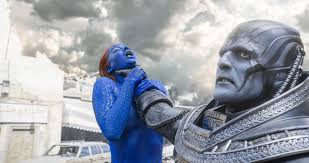Bryan Singer’s X-Men films excel when they focus on emotional drama to drive the story instead of bloated action sequences, villainous master plans or other convoluted set-ups prevalent in superhero films. The mutant X-Men are still human, and there’s no better dramatic fodder than (often irrational, but understandable) human emotion.
The use of real life history and relating the mutants’ problems to zeitgeist-y global issues — xenophobia, kids coming out to their parents, etc. — lends X-Men a gravitas amiss in other comic-book film franchises. Which is to say: you don’t need to like superhero films to like X-Men.
Days of Future Past wiped the slate clean for a new generation of actors and a new timeline in which Eric/Magneto (Michael Fassbender) and Raven/Mystique (Jennifer Lawrence) are more friendly than foe. Apocalypse continues in that timeline, and takes stock of its comic book origins, (literally) unearthing a new baddie.
Apocalypse (Oscar Isaac, barely recognizable under all that Blue Man makeup) is a super-mutant from ancient Egypt who can absorb and amplify other mutants’ powers. Entombed for thousands of years, this supposed god is brought back to life by sun-rays that activate his special hieroglyphic-plastered tomb block thingy.
Nothing about the titular villain’s story is genuinely interesting. The facile glimpse we get of Ancient Egypt shows nothing more than a fascist regime reminiscent of Nazism. Apocalypse’s grandiose claims about people worshipping “false gods” delivered in a disappointed, guttural register — surely an Internet meme in the making — is reminiscent of old-school comic book villainy.
His four disciples — among them a recently traumatized Magneto and a surprise X-Men character — help him try to take over Charles Xavier’s (James McAvoy) consciousness to effectively rule the world through mental manipulation.
The rest of the crew, including Raven, Hank/The Beast (Nicholas Hoult), Scott/Cyclops (Tye Sheridan) and Jean Grey (Sophie Turner), must defeat the undefeatable before it’s too late. Yes, the film is a return to old-school comic-book storytelling. Yes, it forces you to ponder the boring, technical aspects of its world-building (like zeroing in on the “How strong is Apocalypse, though? How many X-Men need to hit him at once?”). And yes, characters’ eyes turn beady black when they feel Apocalypse’s strength coursing through their veins and, of course, Xavier’s pithy yet earnest save-us-all speech tells off Apocalypse for not having any friends.
It’s easy to forgive these sins, perhaps because X-Men: Apocalypse seems to know exactly what it’s doing and feels comfortable and confident in its retro, ‘80s-set world. The film balances its self-seriousness (featuring heartbreaking backstory side plots) with lighthearted humour. It even gets spry with Quicksilver’s (Evan Peters) return — his ability to move at inhuman speeds lends his character a unique comic sensibility as he flicks people out of harm’s way.
X-Men: Apocalypse is an overstuffed epic full of problems and pleasant surprises — the latter often showcased in the little moments, like Wolverine’s (Hugh Jackman) startling cameo, and the consistent thread of female empowerment inspired by Raven’s defiance in the last film, when the image of her mutant body was broadcast all over the world. The look on Raven’s face when she realizes she’s inspired a new generation of mutants, many of them girls, is unmistakable.
If that’s not attention to detail, I don’t know what is.

